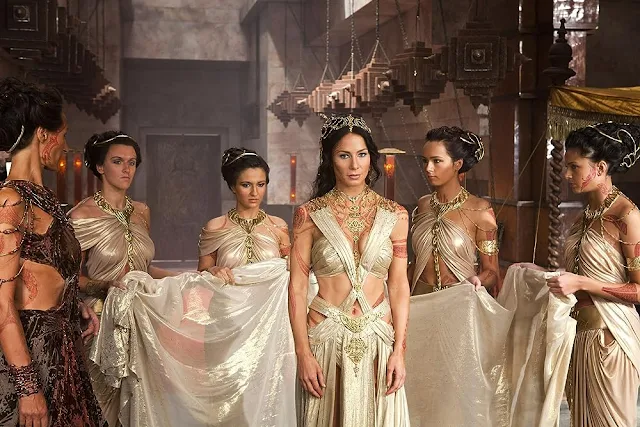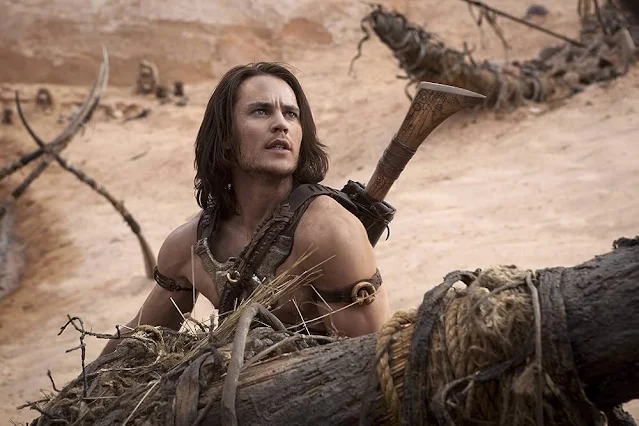The original series, starting with "A Princess of Mars," paved the way for much of modern science fiction, introducing audiences to the captivating landscapes and complex social structures of the fictional Mars, or Barsoom as it's referred to in the books.
Another salient point is the concept of the "Ninth Ray." This mysterious energy source powers the advanced technology on Mars and represents the dual nature of technological advancement. On one hand, it has the potential for immense good, like providing energy to sustain life.
Dejah Thoris, the Princess of Helium, also goes through an arc that addresses these social divides. Initially, she is resigned to marry Sab Than to form an alliance between Helium and Zodanga, despite the glaring inequalities and issues that arise from it. However, as the story progresses, her interactions with John Carter and her experiences outside the palace make her question these age-old beliefs, adding depth to the theme of social justice in the film.

Dejah Thoris, for her part, starts as a royal figure boxed in by her responsibilities and the expectations of her position. Her love story with Carter becomes a catalyst for her own personal liberation, as she chooses love and justice over political convenience, thus redeeming her own character and questioning her society's norms.
These seminal works have influenced a myriad of other stories, from Robert A. Heinlein's "Stranger in a Strange Land" to James Cameron's "Avatar," and have been instrumental in shaping tropes that have become staples in the science fiction genre.
Burroughs' Barsoom series captivated readers with its imagination, adventure, and exploration of complex societal issues. The film adaptation sought to bring this world to a new generation, albeit with modern storytelling techniques and CGI effects. While the movie didn't fare as well as expected at the box office, it did provide a complex narrative that touched upon themes like technology vs. nature, social hierarchy, the role of the outsider, love as a redemptive force, and colonialism.
In the forthcoming discussion, we'll delve deeply into these themes, pulling specific examples from the film to provide a comprehensive analysis. The objective is not just to explore the film in isolation but also to understand its position within the broader science fiction landscape—a genre forever marked by Burroughs' imaginative storytelling.
Burroughs' Barsoom series captivated readers with its imagination, adventure, and exploration of complex societal issues. The film adaptation sought to bring this world to a new generation, albeit with modern storytelling techniques and CGI effects. While the movie didn't fare as well as expected at the box office, it did provide a complex narrative that touched upon themes like technology vs. nature, social hierarchy, the role of the outsider, love as a redemptive force, and colonialism.
In the forthcoming discussion, we'll delve deeply into these themes, pulling specific examples from the film to provide a comprehensive analysis. The objective is not just to explore the film in isolation but also to understand its position within the broader science fiction landscape—a genre forever marked by Burroughs' imaginative storytelling.
The Struggle Between Technology and Nature
In "John Carter of Mars," the tension between technology and nature is palpable. This can be seen in the stark differences between the Thark tribe and the city of Zodanga. The Tharks, led by Tars Tarkas, live in tune with their harsh environment. They navigate through their surroundings, respect the beasts they ride, and live in structures that are seemingly carved out of the landscape.
Zodanga, on the other hand, epitomizes technological advancement. Their city is mobile, literally consuming the land beneath it for fuel, symbolizing the unsustainable exploitation of natural resources.
 |
| The little green men of mars... |
Another salient point is the concept of the "Ninth Ray." This mysterious energy source powers the advanced technology on Mars and represents the dual nature of technological advancement. On one hand, it has the potential for immense good, like providing energy to sustain life.
On the other, its misuse can lead to catastrophic consequences, as seen in the destructive powers it grants to the villainous Sab Than. This duality echoes real-world conversations about technology, such as nuclear energy, which can either power cities or create weapons of mass destruction.
 |
| A Princess of Mars... |
Social Hierarchy and Class Struggle
Barsoom, the fictional representation of Mars in the movie, has a clearly defined social hierarchy, with various species and city-states considering themselves superior or inferior to others. The Tharks, for example, are viewed as barbaric and less civilized than the Heliumites and Zodangans. This hierarchy is not just species-based but also evident within the Thark community, as shown by Sola's lower status due to her being 'fatherless.'Dejah Thoris, the Princess of Helium, also goes through an arc that addresses these social divides. Initially, she is resigned to marry Sab Than to form an alliance between Helium and Zodanga, despite the glaring inequalities and issues that arise from it. However, as the story progresses, her interactions with John Carter and her experiences outside the palace make her question these age-old beliefs, adding depth to the theme of social justice in the film.
The Outsider Hero
John Carter, an Earthman, finds himself inexplicably transported to Mars. While initially, his otherworldly origins give him an outsider's perspective (and physical abilities like incredible strength and the ability to leap great distances due to Mars' lower gravity), he becomes deeply involved in the planet's politics and conflicts.Carter's initial disinterest in getting involved mirrors feelings of isolation or not belonging, a common theme in science fiction where characters often find themselves in alien worlds. However, his ultimate decision to help the Tharks and Heliumites signifies the positive impact an 'outsider' can have on a community, challenging and enriching the status quo.
Love and Redemption
Both John Carter and Dejah Thoris experience a journey of redemption driven by their growing love for each other. Carter, who has lost his family back on Earth and has become somewhat of a cynical loner, finds renewed purpose in his love for Dejah. This relationship doesn't just serve as a plot device but also adds layers to both characters, making their quest for a better Mars a personal one.
Dejah Thoris, for her part, starts as a royal figure boxed in by her responsibilities and the expectations of her position. Her love story with Carter becomes a catalyst for her own personal liberation, as she chooses love and justice over political convenience, thus redeeming her own character and questioning her society's norms.
Colonialism and Imperialism
The imperialist ambitions of Zodanga bear a striking resemblance to colonial attitudes on Earth. Their moving city devours resources and displaces communities in its path, much like colonial powers in human history. John Carter, who was a Confederate cavalryman, represents another form of colonialism.His initial perspective of Mars as a 'new world' where he can escape the sorrows and losses of Earth reflects the problematic mindset of viewing foreign lands as resources for personal rebirth or exploitation.
However, as he learns more about the social fabric and the impending doom of Mars, he transforms from a colonial outsider to an empathetic hero.
These themes create a layered narrative that makes "John Carter of Mars" more than just a simple science fiction action flick. Each theme could be dissected further to uncover the complexities of the characters and the society in which they live, making the movie an interesting subject for in-depth analysis.
These themes create a layered narrative that makes "John Carter of Mars" more than just a simple science fiction action flick. Each theme could be dissected further to uncover the complexities of the characters and the society in which they live, making the movie an interesting subject for in-depth analysis.

















